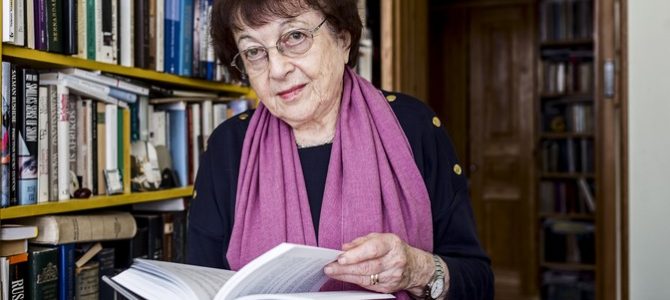December 11, BNS–Intellectual, theater expert, literary expert and human rights activist Irena Veisaitė who passed away December 11 was an exceptionally good person and didn’t feel anger despite many tragic life events, Lithuanian Jewish Community chairwoman Faina Kukliansky told BNS.
“This is a great loss for us. What can you do, people die and let them rest in peace. They say holy people die during the holy days. She died during Hanukkah,” Kukliansky said.
She remembered Veisaitė as an active community member who taught goodness, forgiveness and understanding through the life she lived and in her daily activities.
“This was a unique person who spent half her life in a Jewish family, lived some portion of her life with a family of non-Jewish rescuers and acquired a very varied experience of life, her mother’s death, the goodness of rescuers, she spent some of her life in occupied Kaunas and was sent to Siberia with her rescuers. And despite all these hardships in life, all these problems and losses, she remained very much a person of goodwill. Not just that she was moral and wished everyone well, you’ll almost never hear an ill word about her. Life did not make her angry,” Kukliansky recalled.
The head of the Lithuanian Jewish Community said Veisaitė set an example with her life that there is no meaning in trying to create contradictions between one and another evil, between isolation in the ghetto and deportation.
“Both sides were unjust. She was between them. There were on both sides people who were oppressed, who had lost their fundamental human rights,” Kukliansky said.
Veisaitė’s activities inspired the Lithuanian Jewish Community to greater goodness and better mutual understanding. Kukliansky said Veisaitė was the sort of person who chose to create rather than to make war. She liked music and actively participated in Community events.
Kukliansky recalls Veisaitė remained active and optimistic even in her elderly years.
“She was never alone and never lonely. She never complained. Even about having to climb the stairs to her apartment, she used to tell me the stairs were her salvation because she never stopped walking. Every day she would go out to walk as much as her strength allowed. She really remained in wonderful shape for her age and her inner energy and intelligence prevented her from aging,” Kukliansky said.
Veisaitė was born to a Jewish family in Kaunas in 1928. She was imprisoned in the Kaunas ghetto and was rescued and hidden by Lithuanian friends.
After the Holocaust Veisaitė studied Lithuanian language and literature at Vilnius University and was graduated with a degree in German literature in Moscow in 1953. She was accepted for graduate studies at Leningrad University.
For almost five decades–since 1953, she taught at the Vilnius Pedagogical University. More than 200 of her articles on literature, theater, 20th century Lithuanian-Jewish relations and Holocaust history have been published by journals in Lithuania and abroad. A book of her conversations with the historian Aurimas Švedas was published in 2016.
Veisaitė was also one of the founders of the Georg Soros-funded Lithuanian Open Society Fund and was the chief executive of that organization for many years.
![]()


